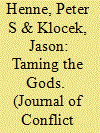| Srl | Item |
| 1 |
ID:
131950


|
|
|
|
|
| Publication |
2014.
|
| Summary/Abstract |
In a novel approach to studying political mobilization among ethnic Tibetans in China, this article addresses two key questions. First, considering the Chinese state's repressive policies towards Tibetan Buddhism, what role does religion play in fomenting Tibetan political resistance? Second, what implications can be drawn from the changing ethnic demography in Tibet about the conflict behaviour of Tibetans? Using various GIS-referenced data, this article specifically examines the 2008 Tibetan protest movements in China. The main results of our analysis indicate that the spread and frequency of protests in ethnic Tibetan areas are significantly associated with the number of officially registered Tibetan Buddhist sites, as well as the historical dominance of particular types of Tibetan religious sects. Furthermore, our analysis shows that the effect of Han Chinese settlement on Tibetan political activism is more controversial than previously though
|
|
|
|
|
|
|
|
|
|
|
|
|
|
|
|
| 2 |
ID:
163438


|
|
|
|
|
| Summary/Abstract |
Despite a robust literature on general forms of state repression, the determinants of religious repression remain unclear. This article argues that a regime’s experience with religious conflict will lead it to be more repressive of religious groups within its territory for three primary reasons. Religious conflict increases the behavioral threat posed by religious groups, lowers the cost of repressing these communities, and evokes vivid memories of past religious violence that underscore the role of the state in taming religion to maintain social order. New, cross-national data on religious conflict and repression from 1990 to 2009 show that religious conflict has a significant and positive effect on the level of religious repression for the time period under investigation, expanding the types and severity of government restrictions on religion in a country. Our findings point to the importance of studying the causes and nature of negative sanctions against religious communities, specifically.
|
|
|
|
|
|
|
|
|
|
|
|
|
|
|
|